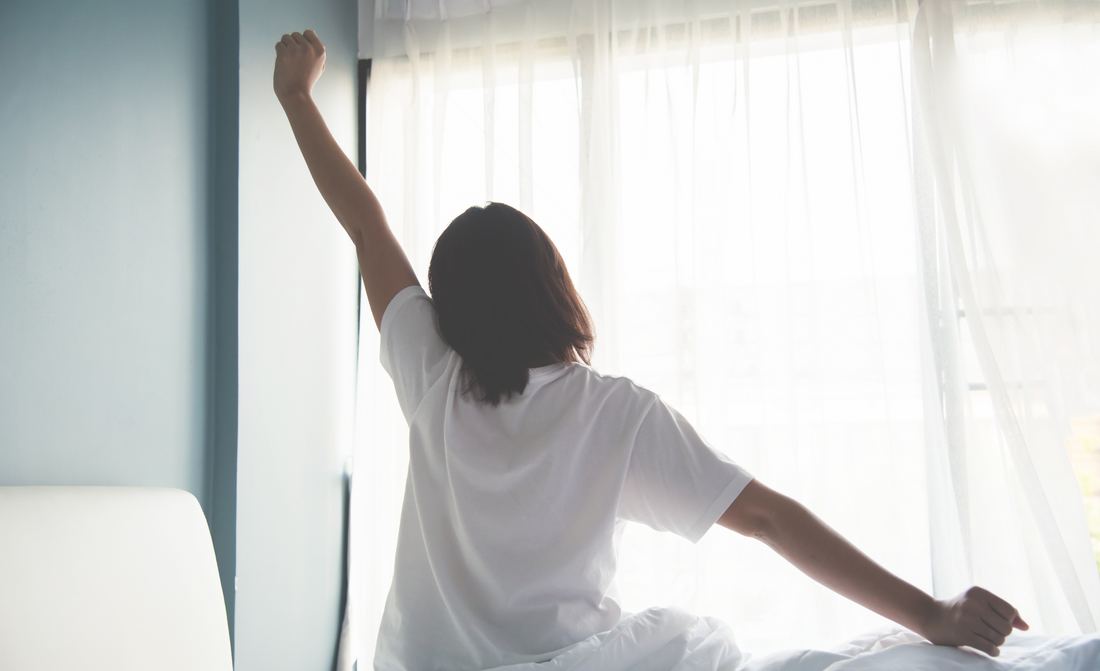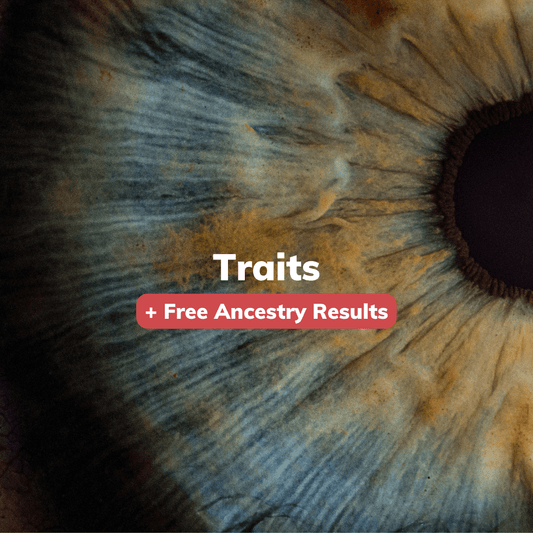
Your insomnia may be linked to genetics
BioCertica Content TeamWritten by: Jonine Moller, M.Sc. in Sports Science
Unfortunately, we live in a day and age where trouble sleeping, and too little sleep are common. Coping with little sleep has become something people tend to brag about. However, chronic sleep deprivation may lead to serious health detriments.
The amount of sleep we need per night is not the same for everyone [1]. Generally, though the minimum amount of sleep humans need is six hours per night [2]. However, once again, some cope better with this amount than others [1, 2].
We can determine how much sleep we need by assessing our ability to upkeep work effectiveness. Some people need less than five hours per night, while others need more than eight to keep functioning productively [2].
The amount of sleep we need is partly dependent on our chronotype [2]. Your chronotype influences your inherent circadian rhythm. In other words, it determines your inherent sleep schedule - your typical sleeping habits or sleep patterns. Your chronotype is what makes you a morning person or an evening person [3].
Control of your circadian rhythm involves your pineal gland and the central nervous system [4]. The pineal gland secretes melatonin - mainly during the evening - to promote sleep [5].
PER2 is an important clock gene that regulates the circadian rhythm. Variations of this gene have been linked to sleep disorders. PER2 is also implicated in the advanced sleep phase syndrome [6].
The advanced sleep phase syndrome is the tendency towards being a morning person. In other words, you naturally tend to become sleepy and fall asleep earlier in the evening and wake earlier in the morning [4].
In contrast, is the delayed sleep phase syndrome. The latter is the natural tendency to stay awake until late at night and then sleep until late morning. The advanced or delayed sleep phase syndromes are related to the timing of the melatonin cycle [4].
The PER2 gene’s variations are also implicated in being associated with insomnia [6]. Insomnia is defined as having difficulties falling asleep and staying asleep. It goes together with daytime tiredness. These sleeping difficulties need to be present at least three times per week for a minimum of three months to be diagnosed as insomnia [7].
Night shift work significantly increases the risk for insomnia. This is due to the length of time it takes the circadian rhythm to adjust to altered sleep and wake times. Also, environmental cues (the natural rhythm of sunlight and night-time darkness) greatly influence the circadian rhythm [8].
The circadian rhythm and the time needed for it to adjust is the reason for jet lag when traveling to other time zones [8].
Getting too little or poor sleep may be due to lifestyle or environmental factors [1, 9]. It may, however, also be linked to several medical conditions. These conditions include fatal familial insomnia, narcolepsy, restless legs syndrome, and sleep apnea [4].
If you suffer from severe sleep problems, medical treatment is warranted. No matter the cause or specific type of condition, going without would be unwise. Inadequate sleep can lead to a multitude of problems, ranging from mild to life-threatening.
Sleep deprivation leads to/causes [1, 2]:
- Increased muscle tonus
- Fatigue and drowsiness
- Decreased attention and concentration
- Increased reaction time
- Irritability
- Increased stress
- Decreased work effectiveness and motivation
- Forgetfulness
- Making errors
- Altered immune functions
Most importantly, brain alterations may occur even after shorter periods of sleep deprivation. These alterations may lead to altered mood states and worsening psychiatric and neurodegenerative disorders [1]. Thus, severe and permanent damage can be caused by not sleeping well enough.
Once again, the effects of sleep deprivation vary between individuals. How sleep deprivation affects behavior is highly heritable. This demonstrates the genetic component of how the body can deal with too little sleep [1].
Long term sleep deprivation (less than 6 hours per night) is associated with increased risk for [1, 2, 3, 9]:
- Obesity
- Type 2 diabetes
- High blood pressure
- Heart disease
- Stroke
- Depression
- Osteoporosis
- Mortality
- Colorectal and breast cancer.
If you struggle to get good quality sleep, be cautious of the following:
- Alcohol consumption before bedtime. Alcohol suppresses your REM (rapid eye movement) sleep. The REM sleeping phase is when you typically dream. The REM sleep phase is vital for your memory and learning [2].
- Stress-management. Stress is a very prevalent cause of sleep deprivation and a risk factor for insomnia. [1, 6]
- Use electronics that emit blue light before bedtime makes it more difficult to fall asleep. Keep televisions, computers, and other electronics out of the bedroom [9].
- Ensure your room is quiet, dark, has a comfortable temperature, and has good ventilation [9].
The first step towards getting better rest may be knowing whether your internal clock is set to go to bed early or late. If you know your genetically set circadian rhythm, you can embrace it instead of fighting it. Embracing it may potentially help you to decrease the risk of sleep problems.
Sleep quality is as important as the number of hours per night [9]. Playing along with your natural circadian rhythm could help you to fall asleep, allowing you more hours, as well as potentially improving your sleep quality.
By ensuring adequate sleep, you’ll improve your health and productivity. Neither sleep nor the need for rest is not a sign of weakness, nor is it a luxury. Sleep is a biological necessity. Take care of yourself by prioritizing your sleep and the factors influencing it.
References:
[1] Gaine, M. E., Chatterjee, S., & Abel, T. (2018). Sleep deprivation and the epigenome. Frontiers in Neural Circuits, 12(February), 1–10. https://doi.org/10.3389/fncir.2018.00014
[2] Orzeł-Gryglewska, J. (2010). Consequences of sleep deprivation. International Journal of Occupational Medicine and Environmental Health, 23(1), 95–114. https://doi.org/10.2478/v10001-010-0004-9
[3] Hu, Y., Shmygelska, A., Tran, D., Eriksson, N., Tung, J. Y., & Hinds, D. A. (2016). GWAS of 89,283 individuals identifies genetic variants associated with self-reporting of being a morning person. Nature Communications, 7, 1–9. https://doi.org/10.1038/ncomms10448
[4] Hamet, P., & Tremblay, J. (2006). Genetics of the sleep-wake cycle and its disorders. Metabolism: Clinical and Experimental, 55(SUPPL. 2), 10–15. https://doi.org/10.1016/j.metabol.2006.07.006
[5] Binks, H., Vincent, G. E., Gupta, C., Irwin, C., & Khalesi, S. (2020). Effects of diet on sleep: A narrative review. Nutrients, 12(4), 1–18. https://doi.org/10.3390/nu12040936
[6] Li, J., Huang, C., Lan, Y., & Wang, Y. (2015). A cross-sectional study on the relationships among the polymorphism of period2 gene, work stress, and insomnia. Sleep and Breathing, 19(4), 1399–1406. https://doi.org/10.1007/s11325-015-1229-4
[7] Jansen, P. R., Watanabe, K., Stringer, S., Skene, N., Bryois, J., Hammerschlag, A. R., de Leeuw, C. A., Benjamins, J. S., Muñoz-Manchado, A. B., Nagel, M., Savage, J. E., Tiemeier, H., White, T., Agee, M., Alipanahi, B., Auton, A., Bell, R. K., Bryc, K., Elson, S. L., … Posthuma, D. (2019). Genome-wide analysis of insomnia in 1,331,010 individuals identifies new risk loci and functional pathways. Nature Genetics, 51(3), 394–403. https://doi.org/10.1038/s41588-018-0333-3
[8] Thun, E., Le Hellard, S., Osland, T. M., Bjorvatn, B., Moen, B. E., Magerøy, N., Steen, V. M., Giddaluru, S., Brattbakk, H. R., & Pallesen, S. (2016). Circadian clock gene variants and insomnia, sleepiness, and shift work disorder. Sleep and Biological Rhythms, 14(1), 55–62. https://doi.org/10.1007/s41105-015-0023-9
[9] Abrams, R. M. (2015). Sleep Deprivation. Obstetrics and Gynecology Clinics of North America, 42(3), 493–506. https://doi.org/10.1016/j.ogc.2015.05.013


